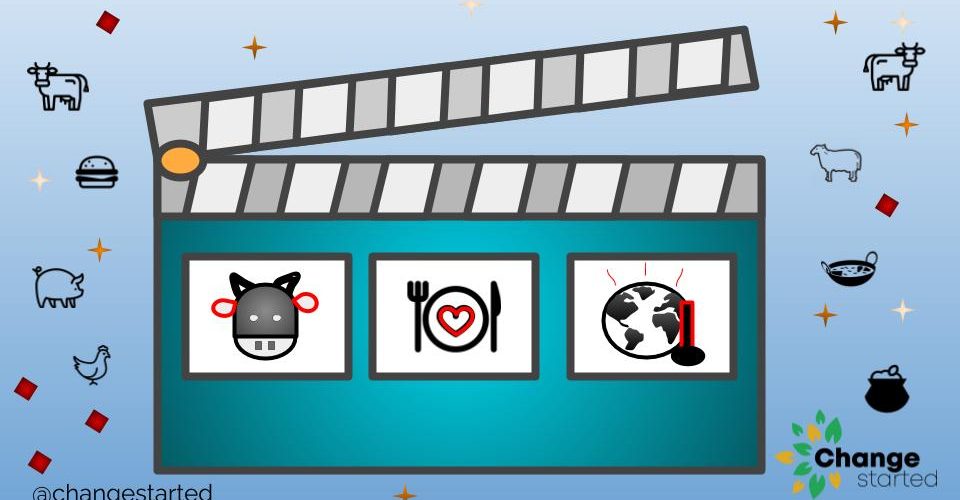What comes to mind when someone refers to food-related videos, movies, or food documentaries?
Most likely, it will elicit memories of lip-smacking delicacies prepared by Gordon Ramsay’s of the World with all the finesse and sprinkling of salt.
For TV enthusiasts, it could be the antics at MasterChef, the famous competitive cooking show.
Or it could be gaping at YouTube or Travel programs that make food travel their premise, bringing colors & cuisines from across the globe.
Lately, it could also be pausing & playing recipe videos for your lockdown home cooking.

Only a few can think of shows & documentaries which showcase something different.
Here is a recommendation on Netflix food documentaries that brings another flavor of the food industry, primarily related to animal meat.
The ingredients of these Netflix documentaries are global warming, methane gases, land & water waste, and the health aspects of consuming animal meat.
What the Health
The 2017 released movie “What the Health” is told from the personal account of the writer and director of the movie Kip Anderson. Kip starts with a confession that he is a “recovering hypochondriac” – a person who worries about their health even though they don’t have any medical condition.
The condition made Kip highly obsessive about his lifestyle. This included refraining from the so-called bad foods (soft drinks, sugar), indulging in an active daily routine, taking every possible supplement, etc. No sooner did he realize that more than anything, it is the processed foods, especially the meat & dairy industry, that are the leading cause of cancer and heart diseases.
The coverage of the documentary is from a US perspective; the director uncovers some astonishing facts about many renowned US-based health organizations like American Cancer Institute (an organization dedicated to eliminating cancer), American Heart Association (an organization that funds cardiovascular medical research), and American Diabetes Association.
In the course of the movie, he points out the hypocrisies of these organizations. They advocate meat-related products as a healthy diet, which is a stark contradiction to various studies.
Many institutions receive sponsorship from meat-promoting multinationals, dairy companies, and even big pharmaceutical companies. Indicating a substantial nexus to keep people away from the truth and make billions of dollars of business.
Apart from health misgivings, the meat industry contributes to greenhouse emissions and deforestation, posing considerable risks to the communities living near animal farms and breeding centers.
The 92 minutes film also takes us through the lives of a few individuals, of how their severe medical condition dramatically changed by switching to a plant-based diet. The movie is interspersed with Kip Anderson’s interviews with physicians, dietitians, researchers, and sports athletes.
-
- Directors – Kip Andersen, Keegan Kuhn
- Producers – Joaquin Phoenix
- Released In – 2017
The Game Changers
The central narrator of the story is former UFC fighter James Wilks, the combative expert who teaches fighting techniques to government agencies. James takes us through the lives of sports athletes, bodybuilders, boxing, firefighters, and sports celebrities, and his life and his father. Everyone narrates their struggles and how changing their diet from meat to plant-based food significantly impacted their body, performance, and endurance.
The 85 minutes food documentary is backed with scientific evidence and research. Interestingly, the vegetarian diet also positively impacts libido and testosterone levels.
The movie has a few minutes of interviews with the great man Terminator. Arnold Schwarzenegger reveals how the meat industry has been propagating a calibrated marketing strategy to advise people that a meat diet is necessary for all required nutrients.
On the contrary, most nutrients come from plants and plant-based diets. The animals are only an intermediary in the process.
The film shatters a misconception that our ancestors used to kill and eat animals; on the contrary, the movie informs us that our teeth are only designed to eat plants and fibers.
As per the film, the leading cause of deforestation is agriculture which is required to feed the animals. With more than 70 billion animals consumed each year globally, about 75% of the agricultural land in the world is used for livestock production.
-
- Directed by – Louie Psihoyos
- Executive Producers – Arnold Schwarzenegger, Jackie Chan, James Cameron
- Released In – 2018
Cowspiracy: The Sustainability Secret
Cowspiracy is the first movie of the director Kip Andersen, where he unearths the reasons for climate change. These reasons are not the typical ones – fossil fuels, transportation, or coal-burning factories, but as per the movie, it is livestock and agriculture farming.
Animal agriculture causes 18% of greenhouse gas emissions, more than transportation.
We are only touching the tip of the iceberg by taking quick showers, recycling, riding bicycles, and turning off the lights. The movie has insightful graphs, creative illustrations, research, and statistics.
Kip Andersen highlights the hypocrisies of environmental conservation organizations, and as per his research, none of them reveal anything about the ecological damages caused due to animal farming.
The movie reveals some interesting facets of animal farming that have never been shown before. Whether it is about the land needed for the animal, the food they eat, the water they drink, or the manure they produce – everything causes environmental degradation.
- “A farm with 2,500 dairy cows produces the same amount of waste as a city of 411,000 people.”
- “Cows produce 150 billion gallons of methane per day.”
- “Growing feed crops for livestock consumes 56% of the water in the US.”
- “Livestock covers 45% of the earth’s total land.”
-
- Directors – Kip Andersen, Keegan Kuhn
- Executive producers – Leonardo DiCaprio
- Released In – 2014
Wrapping Up
Like many documentaries, these also have their share of criticisms. Critics of these food documentaries have pointed to the factual inaccuracies in the information presented.
The movies might have taken a hardened stance on the meat industry and are too pro-vegan, but credit to the makers of these films for showing a very different perspective which not many of us are aware of. The logic in the movies makes sense without going into the statistics or the fact that celebrities produce these food documentaries.
Hence, it is unsurprising that plant-based and lab-grown meat companies have grown phenomenally in the last few years.
One of the key drivers propelling the growth of these companies is the rising awareness among people to reduce their meat consumption for climate reasons.
Ultimately, it is up to us what we eat, but I recommend watching these food documentaries to make an informed choice.






Add comment